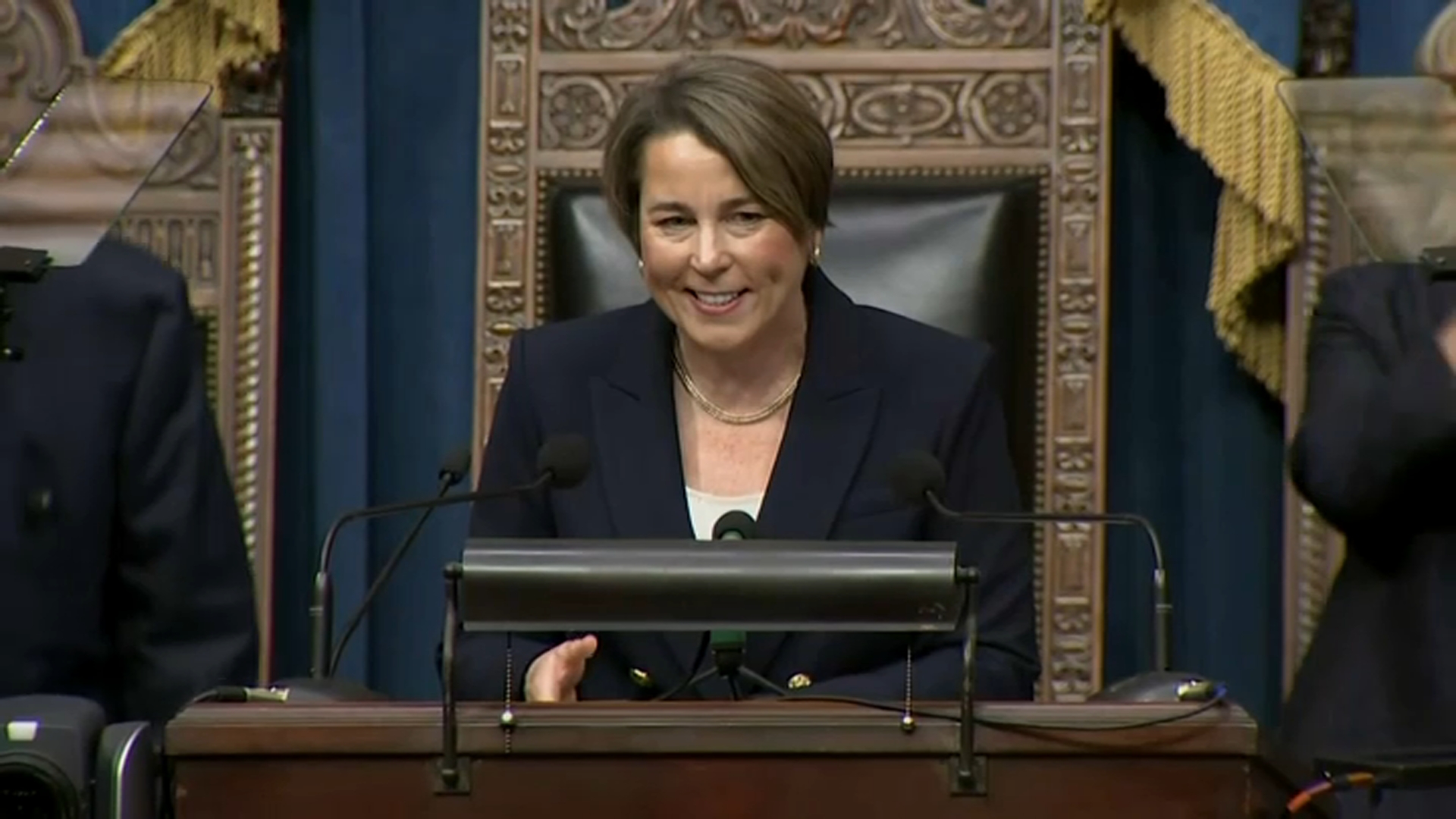
Families may start getting kicked out of the Massachusetts emergency shelter system on Sept. 1, and providers who thought families had until next spring are feeling blindsided.
Lawmakers and Gov. Maura Healey passed a law in April limiting how long families can stay in the emergency shelter system for the first time since the program's creation. The limits were approved while leaving the state's right to shelter law in place.
WATCH ANYTIME FOR FREE
>Stream NBC10 Boston news for free, 24/7, wherever you are. |
The number of families looking to live in state-funded shelters has more than doubled over the last year and a half. With a cap imposed by Gov. Maura Healey still in place, more than 750 families are on a waitlist to gain entry into those shelters.
Trying to rein in exploding shelter costs, Senate and House negotiators agreed in April to set a nine-month limit for how long families can stay in the state's emergency shelters, with the option for families to seek up to two 90-day extensions if they are employed, participating in an approved training program, or meet one of a slew of other protected criteria.
Get updates on what's happening in Boston to your inbox. Sign up for our >News Headlines newsletter.
Legislators wrote that this section of the law would take effect on June 1, and many homelessness service providers assumed families would start hitting their nine-month limit next spring.
But the branch of Healey's administration responsible for writing the regulations required under the law are telling providers that families could be getting notice in the mail as early as next week that they will have to leave by Sept. 1 -- applying the nine-month limit retroactively from June 1 to the start of 2024.
"We've heard [The Executive Office of Housing and Livable Communities] and the administration say that the average length of stay is 14 to 16 months. So we're anticipating that thousands of families will be subjected to early termination based on this policy if they're not granted extensions," said Kelly Turley of the Massachusetts Coalition for the Homeless.
The state's most recent report on emergency family shelters said families stay an average 365 days in shelters, though previous estimates have put the average length of stay between 12 and 18 months.
Not all families whose length of stay is at or beyond nine months will be affected immediately, an EOHLC official said, though they did not say how the office will choose which families will be asked to leave first.
"There's thousands of people," said Andrea Park of the Massachusetts Law Reform Institute, who along with Turley is in touch with providers across the state. "Who's going to go first? Someone who's been there for a year, 13 months, nine months? How will they prioritize people who could potentially get notices on Sept. 1?"
The law instituting shelter limits also explicitly states that no more than 150 families shall be terminated from the program in a single week, to avoid a situation where thousands of families are turned out of shelter at once. Still, many families could now be bracing to be removed from shelter much sooner than expected with uncertainty around who will be asked to leave and when.
Turley and Park said they believe the limit going into effect on Sept. 1 was not the legislative intent of the law, which does not specify if the policy is retroactive or not.
The News Service asked Sen. Michael Rodrigues, the Senate's lead negotiator on the supplemental budget, whether he intended the limit to be applied retroactively.
"I don't remember," Rodrigues replied.
If senators wanted to clarify their intent to give families a full nine months from when they receive notice of termination to when they're removed, the lawmakers had their opportunity this week.
Sen. Pavel Payano of Lawrence filed an amendment to the Senate's fiscal year 2025 budget -- which is being debated this week -- to explicitly state that EOHLC should not consider emergency assistance shelter benefits received prior to June 1 in counting towards the nine month limit.
"The adjustment is especially important for large families, individuals with disabilities, and long-term residents facing eviction," Payano said. "Given that the supplemental budget now offers critical services such as job training, legal assistance, and housing support, it is imperative that these families have sufficient time to access and benefit from these resources. This amendment ensures they are afforded a fair opportunity to stabilize their lives without the looming threat of losing their shelter."
Sens. Paul Mark, Adam Gomez, Liz Miranda, Jamie Eldridge, Pat Jehlen, Lydia Edwards and Robyn Kennedy all sponsored the amendment, but it was withdrawn without debate.
Asked about the amendment and if lawmakers meant for families to have until next spring in shelters, Spilka replied, "We will talk to providers and the administration to follow up with that more."
A spokesperson for Spilka then followed up, saying it was the branch’s “understanding that the administration is implementing the provisions of the supplemental budget as they were intended when they were approved by the Legislature.”
The House had a similar response when asked Wednesday.
More on the emergency shelter system in Mass.
"The intention behind the legislation was to provide the administration with the flexibility necessary to manage the crisis appropriately, while also ensuring that folks in the shelter system have access to the resources that they need in order to eventually exit the system, and to successfully enter the workforce," House Speaker Ron Mariano and House Ways and Means Chair Aaron Michlewitz said in a statement.
Michlewitz previously said the new shelter policies are intended to make sure people have enough time to use new resources made available in the bill, such as workforce training, English language teaching services and assistance with rehousing, before they face the nine-month deadline.
"I think it's something that we're certainly concerned about, making sure that people have enough time to get the workforce visas, to be able to get their life in a situation where they can get out of the system," Michlewitz told reporters in April. "But we want to make sure that we have pieces that are in there, that moves it, keeps moving it along in a positive manner as quickly as possible."
He later added during that scrum in April, "We may be in a completely different place nine months from now, so we have to continue to evaluate and make decisions based off of what's in front of us."
Park and Turley said they are hearing from providers that they are staffing up for the administrative effort of processing waivers and renewals, and helping families who don't speak English understand what will happen if they get a notice that they have to leave this fall.
"Those are resources that should be going to housing search and helping people safely find housing," Park said. "Hospitals, providers, everybody understood this was a policy that was going to be implemented in a way that gave us time to scale up immigration support services, clinics, job partnering -- these things are actually starting to pay off -- but now we're going to put people out before they're ready and local cities and towns and nonprofits are going to bear the brunt of that."
Recent investments in rehousing benefits and shelter supports have yielded a steady uptick in the rate at which families are exiting the emergency shelter system, according to EOHLC.
Over the last five months, 1,208 families have exited shelter: 197 in December, 209 in January, 230 in February, 269 in March and 303 in April, as expanded housing and job placement services have been funded by the state
"Given the lack of deeply affordable housing, low vacancy rates and other barriers that families are facing, including newly arrived immigrant families who are just getting on their feet here in Massachusetts, we do expect that thousands of families will be negatively impacted. A time limit that's so short is going to set families up for failure," Turley said.
Get updates on what's happening in Boston to your inbox. Sign up for our News Headlines newsletter.




